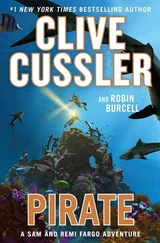Clive Cussler - Shock Wave
Здесь есть возможность читать онлайн «Clive Cussler - Shock Wave» весь текст электронной книги совершенно бесплатно (целиком полную версию без сокращений). В некоторых случаях можно слушать аудио, скачать через торрент в формате fb2 и присутствует краткое содержание. Год выпуска: 1996, ISBN: 1996, Издательство: Simon & Schuster, Жанр: Детектив, на английском языке. Описание произведения, (предисловие) а так же отзывы посетителей доступны на портале библиотеки ЛибКат.
- Название:Shock Wave
- Автор:
- Издательство:Simon & Schuster
- Жанр:
- Год:1996
- ISBN:978-0684802978
- Рейтинг книги:5 / 5. Голосов: 1
-
Избранное:Добавить в избранное
- Отзывы:
-
Ваша оценка:
- 100
- 1
- 2
- 3
- 4
- 5
Shock Wave: краткое содержание, описание и аннотация
Предлагаем к чтению аннотацию, описание, краткое содержание или предисловие (зависит от того, что написал сам автор книги «Shock Wave»). Если вы не нашли необходимую информацию о книге — напишите в комментариях, мы постараемся отыскать её.
Shock Wave — читать онлайн бесплатно полную книгу (весь текст) целиком
Ниже представлен текст книги, разбитый по страницам. Система сохранения места последней прочитанной страницы, позволяет с удобством читать онлайн бесплатно книгу «Shock Wave», без необходимости каждый раз заново искать на чём Вы остановились. Поставьте закладку, и сможете в любой момент перейти на страницу, на которой закончили чтение.
Интервал:
Закладка:
“The convergence will occur in sixteen days,” said Sandecker darkly.
“I’ll be back to you in four,” the President assured him.
“That still leaves us plenty of time to carry out a plan of action,” said Hutton.
The President reached out his hand. “Thank you for bringing this matter to my attention, Admiral,” he said in official jargon. “I promise to give your report my fullest attention.”
“Thank you, Mr. President,” said Sandecker. “I couldn’t ask for more.”
As Hutton showed him out of the Oval Office, he said, “Don’t worry, Jim. I’ll personally shepherd your warning through the proper channels.”
Sandecker fixed him with a blistering glare. “Just make damned sure the President doesn’t let it fall through the cracks, or there won’t be anyone left in Honolulu to vote for him.”
Four days without water. The sun’s unrelenting heat and the constant humidity sucked the perspiration from their bodies. Pitt would not let them dwell on the empty vastness that could depress all physical energy and creative thought. The monotonous lapping of the waves against the boat nearly drove them mad until they became immune to it. Ingenuity was the key to survival. Pitt had studied many shipwreck accounts and knew that too many shipwrecked mariners expired from lethargy and hopelessness. He drove Maeve and Giordino, urging them to sleep only at night and keep as busy as possible during daylight hours.
The prodding worked. Besides serving as the ship’s butcher, Maeve tied lines to a silk handkerchief and trailed it over the stern of the boat. Acting as a finely meshed net, the handkerchief gathered a varied collection of plankton and microscopic sea life. After a few hours, she divided her specimens into three neat piles on a seat lid, as if it were some sort of salad-of-the-sea.
Giordino used the harder steel of the Swiss army knife to notch barbs into the hook fashioned from Pitt’s belt buckle. He took over the fishing duties, while Maeve put her knowledge of biology and zoology to work, expertly cleaning and dissecting the day’s catch. Most shipwrecked sailors would have simply lowered the hook into the sea and waited. Giordino skipped preliminary fish seduction. After baiting the hook with the choicer, more appetizing, to fish at any rate, morsels from the shark’s entrails, he began casting the line as if he were a cowboy roping a calf, slowly reeling it in over his elbow and the valley between his thumb and forefinger, jiggling it every meter to give life to the bait. Apparently, finding a moving dinner acted as an enticement to his prey, and soon Giordino hooked his first fish. A small tuna bit the lure, and less than ten minutes later the bonito was reeled on board.
The annals of shipwrecked sailors were rife with tales of those who died of starvation while surrounded by fish, because they lacked the basic skills to catch them. Not Giordino. Once he got the hang of it and sharpened his system to a fine science, he began to pull in fish with the virtuosity of a veteran fisherman. With a net, he could have filled the entire boat in a matter of hours. The water around and beneath the little craft looked like an aquarium. Fish of every size and luminescent color had congregated to escort the castaways. The smallest, vibrantly colored fish came and drew the larger fish that in turn attracted the larger sharks that made an ominous nuisance of themselves by bumping against the boat.
Menacing and graceful at the same time, the killers of the deep glided back and forth beside the boat, their triangular fins cutting the water surface like a cleaver. Accompanied by their entourage of legendary pilot fish, the sharks would roll on their sides as they slid under the boat. Rising on the crest of a swell when the boat was in a trough, they could actually stare down at their potential victims through catlike eyes as lifeless as ice cubes. Pitt was reminded of a Winslow Homer painting, a print of which had hung in a classroom of his elementary school. It was called the Gulf Stream. In the scene a black man was shown floating on a demasted sloop surrounded by a school of sharks, with a waterspout in the background. It was Homer’s interpretation of man’s uneven struggle against natural forces.
The old tried-and-true method devised by castaways and early navigators of chewing the moisture out of the raw fish was a feature of meals, along with the shark meat dried into jerky by the sun. Their sushi bar was also enhanced by two fair-sized flying fish they found flopping in the bottom of the boat during the night. The oily flavor of fresh, raw fish did not win any gourmet awards with their taste buds, but it went a long way in diminishing the agony of hunger and thirst. Their empty stomachs were appeased after only a few bites.
The need to replenish their body fluids was also lessened by dropping briefly over the side every few hours while the others kept a sharp eye’ out for sharks. The cooling sensation generated by lying in wet clothes under the shade of the boat cover helped fight the misery of dehydration as well as the torment of sunburn. It also helped to dissolve the coating of salt that rapidly accumulated on their bodies.
The elements made Pitt’s job of navigating fairly simple. The westerly winds out of the Roaring Forties were carrying them east. The current cooperated and flowed in the same direction. For determining his approximate position, a rough estimate at best, he relied on the sun and stars while using a cross-staff he’d fashioned of two slivers of wood cut from the paddle.
The cross-shaft was a method of determining latitude devised by ancient mariners. With one end of the shaft held to the eye, a crosspiece was calibrated by sliding it back and forth until one end fit exactly between either the sun or star and the horizon. The angle of latitude was then read on notches carved on the stag. Once the angle was established, the mariner was able by crude reckoning to establish a rough latitude without published tables for reference. To determine his longitude-in Pitt’s case, how far east they were being driven-was another matter.
The night sky blazed with stars that became glittering points on a celestial compass that revolved from east to west. After a few nights of fixing their positions, Pitt was able to record a rudimentary log by inscribing his calculations on one end of the nylon boat cover with a small pencil Maeve had fortuitously discovered stuffed under a buoyancy tube. His primary obstacle was that he was not as familiar with the stars and constellations this far south as he was with the ones found north of the equator, and he had to grope his way.
The light boat was sensitive to the wind’s touch and often swept over the water as if it were under sail. He measured their speed by tossing one of his rubber-soled sneakers in front of the boat that was tied to a five-meter line. Then he counted the seconds it took the boat to pass the shoe, pulling it from the water before it drifted astern. He discovered that they were being pushed along by the westerly wind at a little under three kilometers an hour. By rigging the nylon boat cover as a sail and using the paddle as a short mast, he found they could increase their speed to five kilometers, or an easy pace if they could have stepped out of the boat and walked alongside.
“Here we are drifting rudderless like jetsam and flotsam over the great sea of life,” Giordino muttered through salt-caked lips. “Now all we have to do is figure out a way to steer this thing.”
“Say no more,” said Pitt, using the screwdriver to remove the hinges on a fiberglass seat that covered a storage compartment. In less than a minute, he held up the rectangular lid, which was about the same size and shape as a cupboard door. “Every move a picture.”
Читать дальшеИнтервал:
Закладка:
Похожие книги на «Shock Wave»
Представляем Вашему вниманию похожие книги на «Shock Wave» списком для выбора. Мы отобрали схожую по названию и смыслу литературу в надежде предоставить читателям больше вариантов отыскать новые, интересные, ещё непрочитанные произведения.
Обсуждение, отзывы о книге «Shock Wave» и просто собственные мнения читателей. Оставьте ваши комментарии, напишите, что Вы думаете о произведении, его смысле или главных героях. Укажите что конкретно понравилось, а что нет, и почему Вы так считаете.












